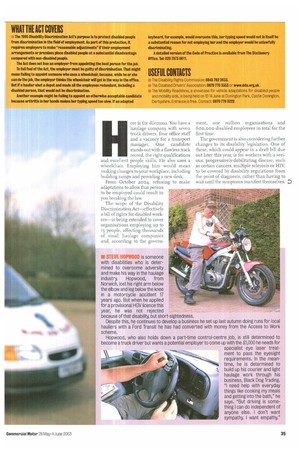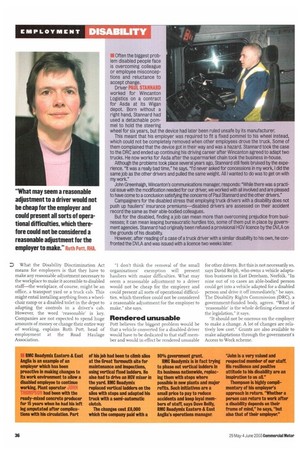H ere is the dilemma. You have a haulage company with
Page 35

Page 36

If you've noticed an error in this article please click here to report it so we can fix it.
seven truck drivers, four office staff and a vacancy for a transport manager. One candidate stands out with a flawless track record, the right qualifications and excellent people skills. He also uses a wheelchair. Employing him would mean making changes to your workplace, including building ramps and providing a new desk.
From October 2004, refusing to make adaptations to allow that person to be employed could result in you breaking the law.
The scope of the Disability Discrimination Act—effectively a bill of rights for disabled workers—is being extended to cover organisations employing up to 15 people, affecting thousands of small haulage companies and: according to the govern
went, one million organisations and 6 oo, oo o disabled employees in total for the first time.
The government is also considering further changes to its disability legislation. One of these, which could appear in a draft bill due out later this year, is for workers with a serious, progressively-debilitating disease, such as certain cancers, multiple sclerosis or HIV, to be covered by disability regulations from the point of diagnosis, rather than having to wait until the symptoms manifest themselves.
D What the Disability Discrimination Act means for employers is that they have to make any reasonable adjustment necessary to the workplace to make it accessible to disabled staff—the workplace, of course, might be an office, a transport yard or a truck cab. This might entail installing anything from a wheelchair ramp or a disabled toilet in the depot to adapting the controls in a driver's cab. However, the word 'reasonable' is key. Companies are not expected to spend huge amounts of money or change their entire way of working, explains Ruth Pott, head of employment at the Road Haulage Association.
"I don't think the removal of the small organisations' exemption will present hauliers with major difficulties. What may seem a reasonable adjustment to a driver would not be cheap for the employer and could present all sorts of operational difficulties, which therefore could not be considered a reasonable adjustment for the employer to make," she says.
Rendered unusable
Pott believes the biggest problem would be that a vehicle converted for a disabled driver would have to be dedicated to that staff member and would in effect be rendered unusable for other drivers. But this is not necessarily so, says David Relph, who owns a vehicle adaptation business in East Dereham, Norfolk. "In nine out of TO cases an able-bodied person could get into a vehicle adapted for a disabled person and drive it off immediately," he says. The Disability Rights Commission (DRC), a government-funded body, agrees, "What is 'reasonable' is the whole defining element of the legislation," it says.
"It should not be onerous on the employer to make a change. A lot of changes are relatively low cost" Grants are also available to make adaptations through the government's Access to Work scheme.
























































































































































